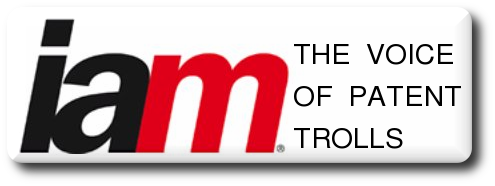

THERE IS A WAR against GNU/Linux. It's a very big war. But a lot of it happens in the back room and it is being led by Microsoft, a notoriously corrupt company that still relies on bribes and blackmail for a lot of its deals (we have given many examples in the past).
"Not all of this officially counts/qualifies as patent revenue (royalties) because Microsoft uses a clever trick now.""Software patents are usually patents on the obvious wrapped up in as obscure, vague and technical a language as possible," the site said. "In this case Google has been found guilty of infringing a "sandbox" patent in Chrome."
That's a software patent and it was found valid in one of those notorious courts in the Eastern District of Texas, so Google will hopefully appeal. But there is an even broader war going on, some of which involves Microsoft satellites that keep suing Android (or GNU/Linux) device makers. We provided plenty of examples in past years.
"This trick started about a year ago with Acer, not too long after it naturally followed from a lawsuit against Samsung that yielded a settlement 2 years ago (same effect, same consequences)."Microsoft itself is playing this aggressive game also directly, though it learned how to disguise it a little better. It is trying to make billions of dollars by shaking down Android OEMs and Chrome OS OEMs (often the same OEMs -- more or less -- as these two operating systems overlap one another more and more over time). Not all of this officially counts/qualifies as patent revenue (royalties) because Microsoft uses a clever trick now.
This trick started about a year ago with Acer, not too long after it naturally followed from a lawsuit against Samsung that yielded a settlement 2 years ago (same effect, same consequences). Then came Xiaomi (not only bundling of Microsoft malware but also payments to Microsoft, in the form of patent purchases). This was all along misportrayed by IAM, as we repeatedly showed. Either they are willfully ignorant or maliciously lying about it. Today IAM published another one of these puff pieces. It paints Microsoft as some kind of "good cop", but what the author of this article conveniently neglects to say (or twists the facts of) is that Microsoft previously blackmailed HTC using software patents (around the same time Apple did so).
Here is how IAM put it:
The Microsoft petition – jointly filed with Taiwan’s HTC – argues that claims 14, 15 and 17 of the ‘695 patent should be invalidated on grounds of obviousness. The petition also notes that the ‘695 patent has been asserted by Philips along with several other patents in a series of infringement cases it filed in the District of Delaware back in December 2015. The seven of these lawsuits that remain active target Acer, Asus and HTC from Taiwan; Double Power Technology and Yifang from China; and US companies Visual Land and Southern Telecom. Microsoft has joined the Acer, Asus, Double Power, Visual Land and Yifang cases as a counter-defendant; it is also involved in the HTC case as an intervenor-plaintiff.
[...]
Of the defendants in the Philips lawsuits, we know that Microsoft signed HTC as a patent licensee back in 2010, and that it has revised and expanded existing IP licensing deals with Acer and Asus in recent years. With regards to both the latter, this involved the pre-installation of some of the US company’s software products on the Taiwanese manufacturers’ devices; this has also been a feature of headline patent deals signed with other major Asian companies, including Lenovo and Xiaomi. It may be the case that Microsoft has also offered some form of patent risk mitigation, similar to the aforementioned cloud customer programme, as part of these agreements – though that is just my speculation at this stage, and would be difficult to confirm since the details of such licensing arrangements are typically highly confidential.
Avanci was launched last September with Qualcomm, Ericsson, ZTE, KPN, InterDigital and Sony all agreeing to make their standard essential patents that read on 2G, 3G and 4G technology available for license across a range of IoT industry verticals. The first three sectors that Avanci has targeted are the auto industry, connected homes and smart meters. There’s no doubt that Avanci brings together some of the leading plays in wireless technology, but it also has some notable gaps such as Nokia and Huawei. Five months after it launched it is yet to conclude any licensing agreements, although Alfalahi insisted that feedback from the industry and from regulators has been positive and that his team continues to talk to a wide range of licensees and possible members. “We’re not saying that cross-licensing or one-on-one licensing doesn’t work, we just believe there’s a better way and over the last year it has become clear there is a need in the market,” he said.